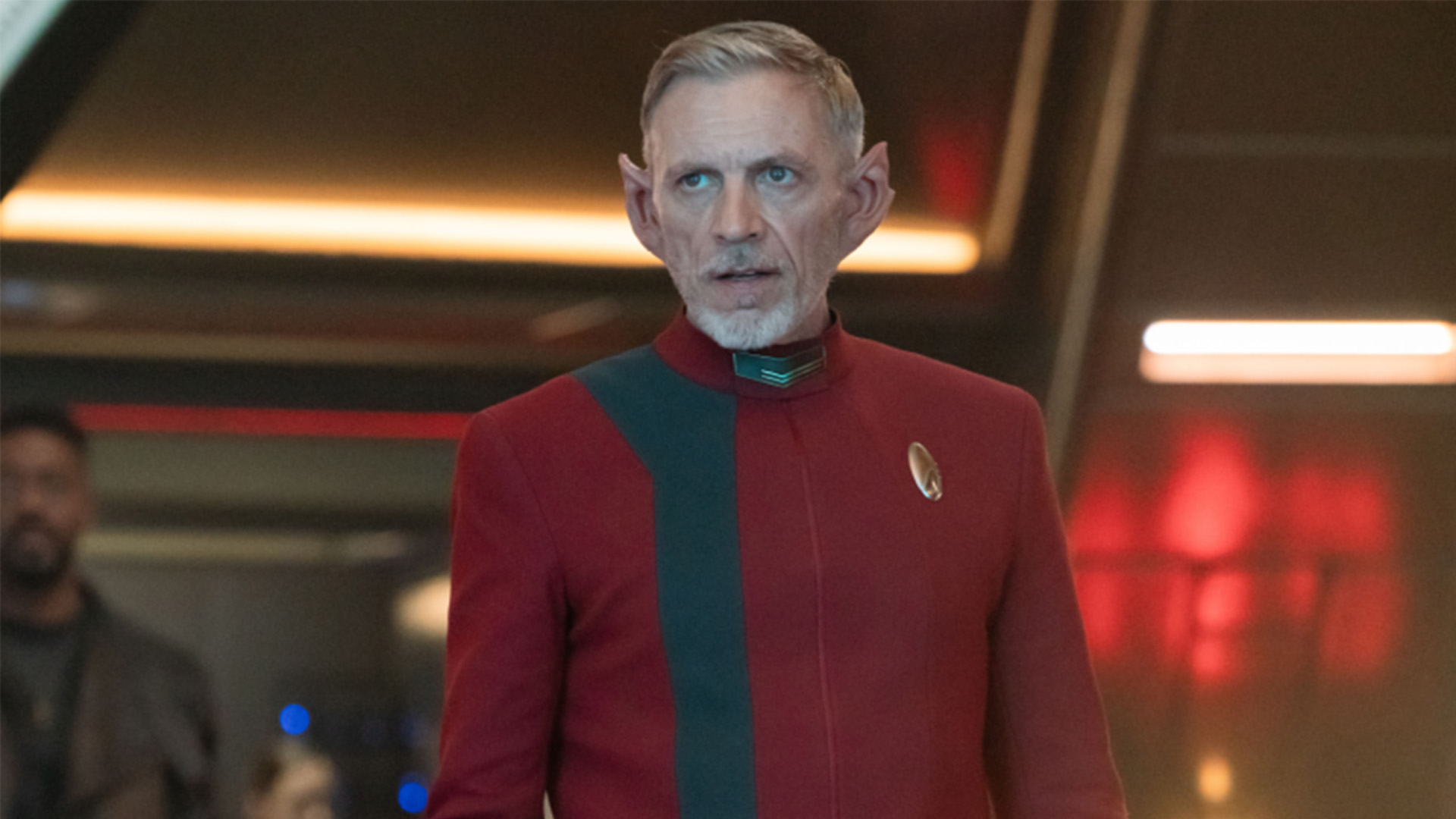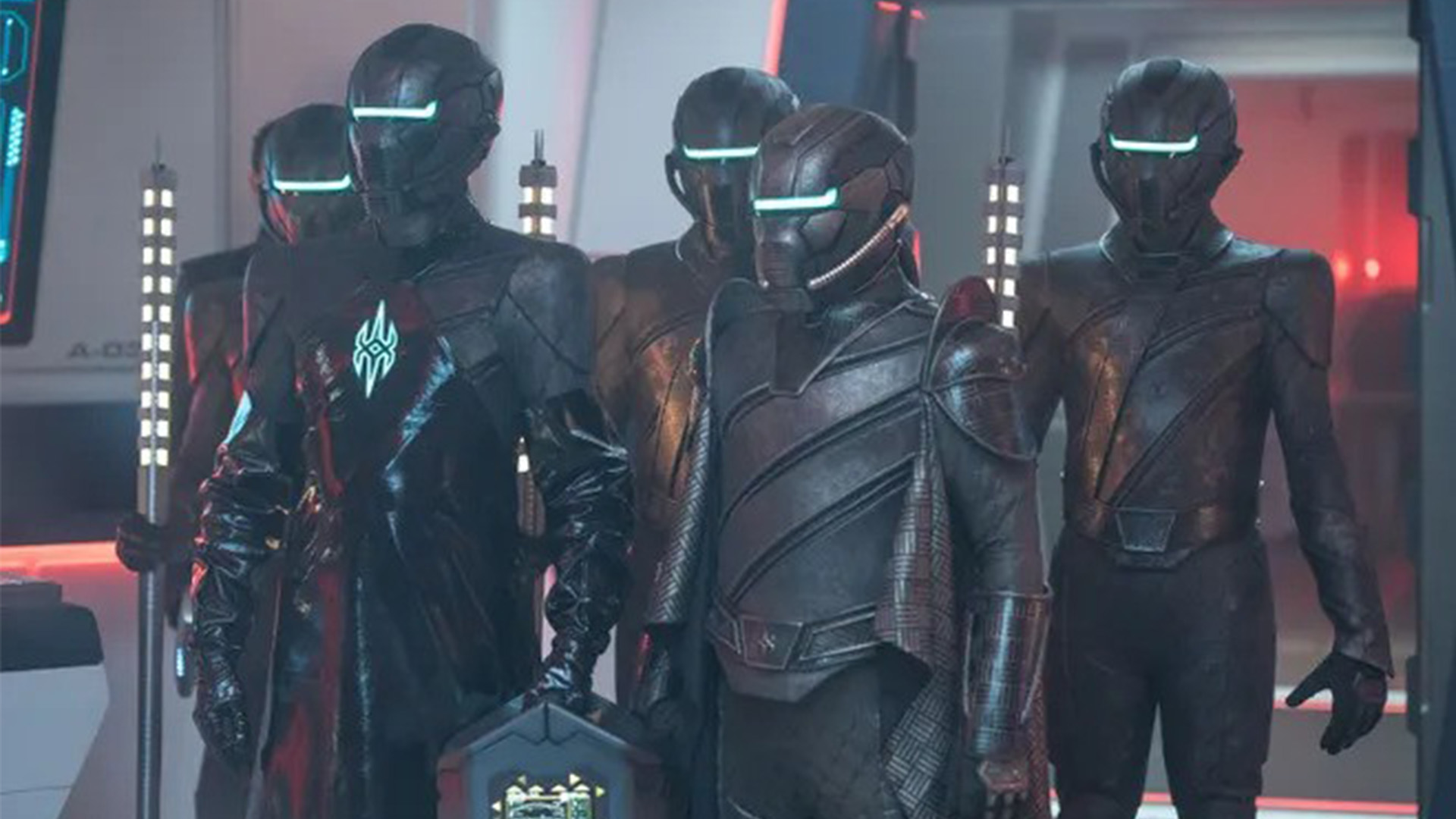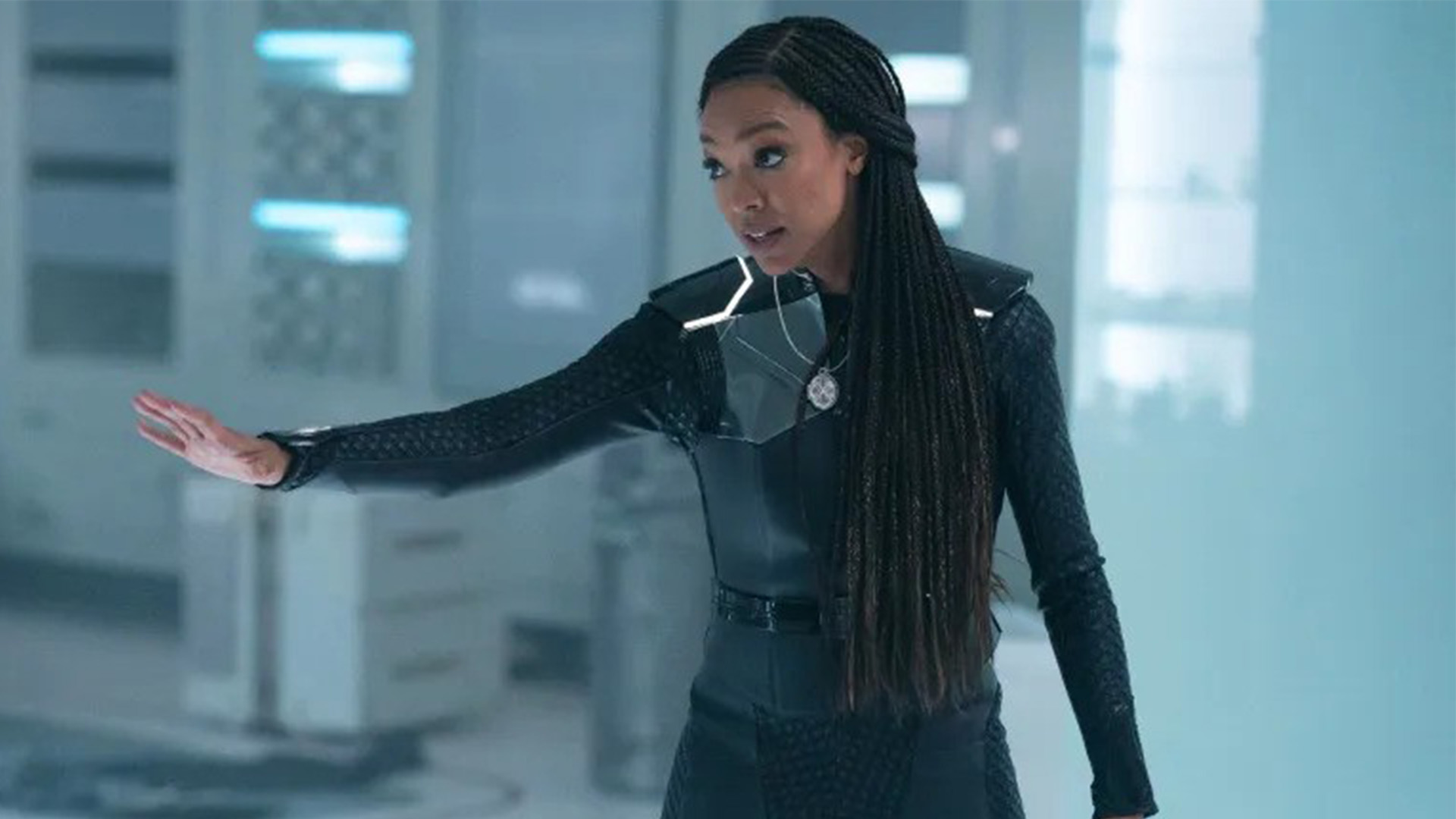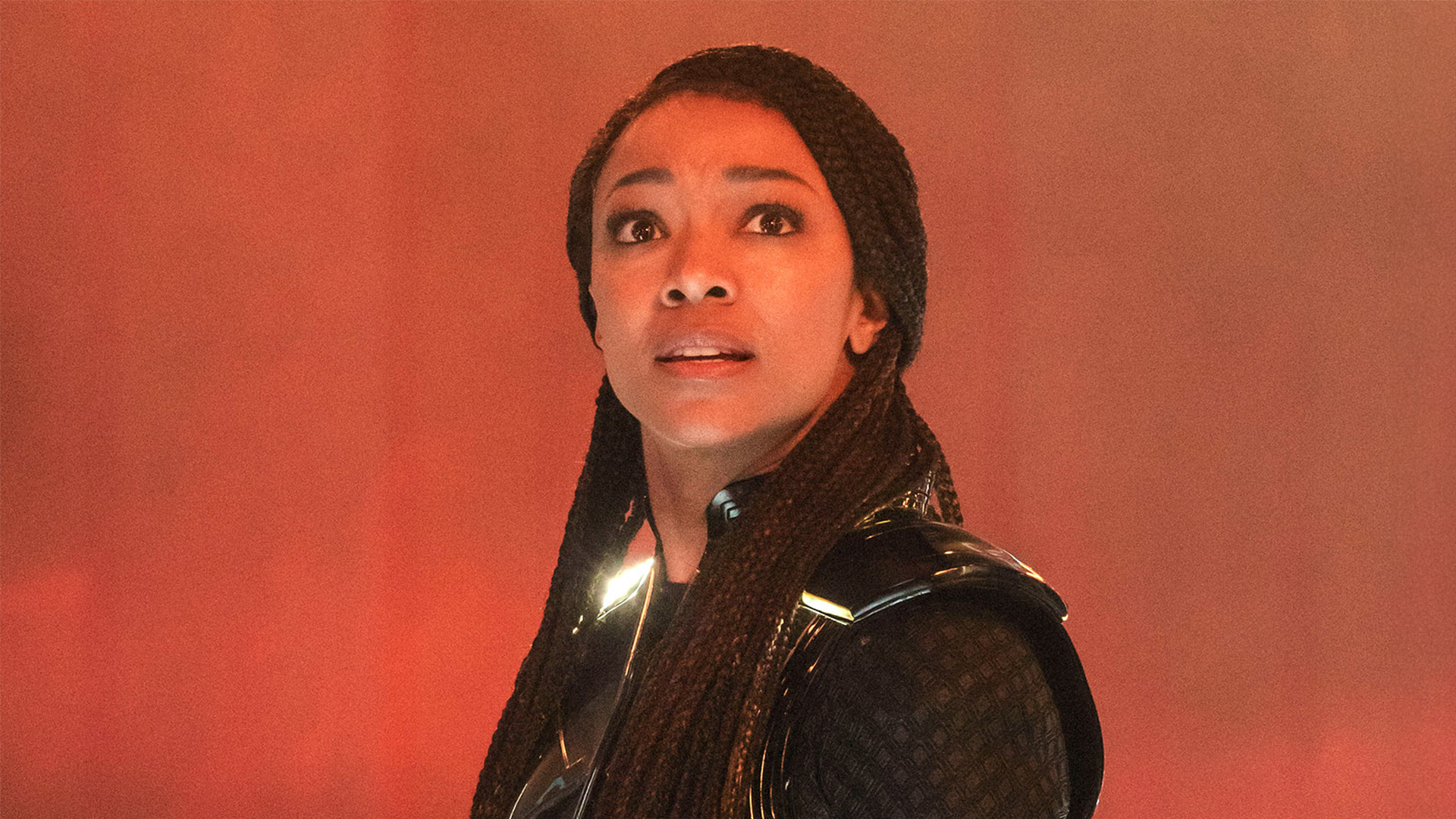GamesRadar+ Verdict
A spectacular but uneven final voyage for a spectacular but uneven TV show. With plenty of big ideas and some cute callbacks to classic Trek of the past, it's much more fun than the ultra-serious season 4, but it still can't match the spirit of adventure of Strange New Worlds and Picard's big finale.
Why you can trust GamesRadar+
Warning - spoilers for the Star Trek: Discovery series finale follow. If you haven't seen the episode, look away now!
Talk about ambitious. Star Trek: Discovery’s fifth and final season spans the whole breadth of the Star Trek timeline (give or take), all the way from the distant future of the 32nd century back to the origins of humanity (and pretty much every other sentient species in the galaxy) billions of years ago.
Over the course of its 10 episodes, it does its best to tick off as many familiar Trek tropes as possible – the Mirror Universe, virtual reality simulations, wibbly-wobbly timey-wimey stuff – as Captain Burnham and her crew lead us on a whistle-stop tour through key moments in the franchise’s history. And yet, for all its striking ideas and several genuinely thrilling episodes, Discovery’s swan-song can’t help playing it safe.
A treasure hunt

The season’s McGuffin is a bizarre contradiction, an unashamed slice of fan service that also has the potential to alter the Alpha Quadrant as we know it. Back in 1993, The Next Generation episode 'The Chase' provided a cute in-universe explanation for the fact that Klingons, Cardassians, Vulcans, and the vast majority of the galactic population look like humans with prosthetics stuck to their faces. It revealed that an ancient civilisation had seeded the primordial oceans of hundreds of worlds, shaping their evolution and ensuring that their genetic code lived on. But if it ever turned up again, this life-giving “Progenitor” technology could be twisted to become the ultimate doomsday weapon, much like the Genesis torpedo in classic Trek movie The Wrath of Khan.
With Discovery dispatched on a top-secret, race-against-time mission to ensure Starfleet tracks down the tech before anyone else, it develops into the perfect hook for a serialised Star Trek arc. Yes, there’s something inherently ludicrous about pursuing a treasure trail left behind by Federation scientists 800 years earlier (Raiders of the Lost DNA?), but – after an undeniably slow start – this framework allows the writers to add extra urgency to a range of traditional, effectively standalone stories. In this final season, the obligatory Prime Directive story, 'Whistlespeak', carries extra weight because the fate of an entire galaxy depends on whether or not Burnham announces her true space-faring identity to a pre-warp race.
The season is also packed with sci-fi invention, from a Doctor Who-esque library that’s home to all the knowledge in the universe to a journey into multi-dimensional space that plays out like a cross between 2001: A Space Odyssey and The Hitchhiker’s Guide to the Galaxy’s planet factories. That everything looks eye-poppingly spectacular is almost a given in an era where TV visuals regularly match their movie counterparts, but that doesn’t mean the VFX team don’t deserve a huge round of applause.
A sidelined crew

For all the leaps forward made by season 5, however, it turns out that the problems of the 32nd century never really went away. It remains a big disappointment, for example, that the Discovery crew have never encountered a worthy adversary in the distant future. Admittedly, despite displaying plenty of underdog ingenuity, interstellar Bonnie and Clyde duo L’ak and Moll were never likely to be the biggest bads on the game board. But bringing back the Breen, ruthless accomplices of the Dominion in the final season of Deep Space Nine, doesn’t fit the bill either.
With a general air of mystery (an incomprehensible language, gelatinous anatomy) and armor pinched wholesale from Princess Leia’s Boushh disguise in Return of the Jedi – their updated look in Discovery shouldn’t concern copyright lawyers quite so much – the Breen worked because we knew so little about them. But by giving us a glimpse behind the mask, that mystique evaporates as quickly as Boba Fett’s did in his self-titled TV show. Even with all that firepower behind the Imperium, the revelation that L’ak is the first Breen face we’ve ever seen on screen is more likely to generate a “huh?” than a “wow”.
But even more frustrating is the show’s ongoing inability to get the best out of its crew. Of all the Treks, Discovery features the least balanced ensemble, so over-reliant on the borderline superheroics of Michael Burnham (is there any puzzle she can’t solve?) that it’s still a struggle to name half of the bridge officers.
Sidelining familiar faces Detmer and Owosekun for the second half of the season is a weird choice (they’re nominally flying the Mirror Universe Enterprise back to base), while even names higher up the cast list feel short-changed. Saru – a former captain of the Discovery, don’t forget – arguably gets his best moment off-screen, when it’s revealed that his Mirror Universe counterpart instigated a rebellion. And it almost seems unfair that the season’s most satisfying arc should belong to the ship’s wonderfully prickly new first officer, Rayner (Battlestar Galactica’s Callum Keith Rennie), one of the few characters who doesn’t sound like they’ve swallowed a book of motivational quotes.
An implausibly neat bow

At the end of a season that – once again – sees every visible member of the crew defy impossible odds to make it to the end in one piece, the inevitable flash-forward coda ties things up in an implausibly neat bow. Book, in particular, appears to have been kept on board simply to prolong his on/off romance with Michael, and there’s something a little too contrived about their grown-up, Starfleet captain son turning up to introduce his new ship: the USS Discovery-A (especially after Picard’s son, Jack, did the exact same thing with the Enterprise-G in the Star Trek: Picard finale).
Still, long-term fans will get a kick out of the revelation that the incongruous, suit-and-tie-wearing Dr Kovich (played by legendary director David Cronenberg) is actually Crewman Daniels, the time agent from Star Trek: Enterprise. They’ll also enjoy the nod to Discovery computer Zora’s upcoming meeting with a man named Craft in the even further future of Short Trek episode 'Calypso'.
But, like the two 32nd century-set seasons that preceded it, Discovery’s fun but uneven final voyage struggles to live up to the brave, twist-heavy storytelling that was a hypo-spray in the arm for a veteran franchise when the show launched in 2017. Discovery always did its best to boldly go where no one had gone before, but when it comes to exploring strange new worlds, there’s no question others did it better.
Star Trek: Discovery season 5 is available on Paramount Plus in the US and the UK.
For more, check out our guide to the best Star Trek episodes that every Trekkie should watch right now.
More info
| Genre | Sci-fi |
Richard is a freelancer journalist and editor, and was once a physicist. Rich is the former editor of SFX Magazine, but has since gone freelance, writing for websites and publications including GamesRadar+, SFX, Total Film, and more. He also co-hosts the podcast, Robby the Robot's Waiting, which is focused on sci-fi and fantasy.



